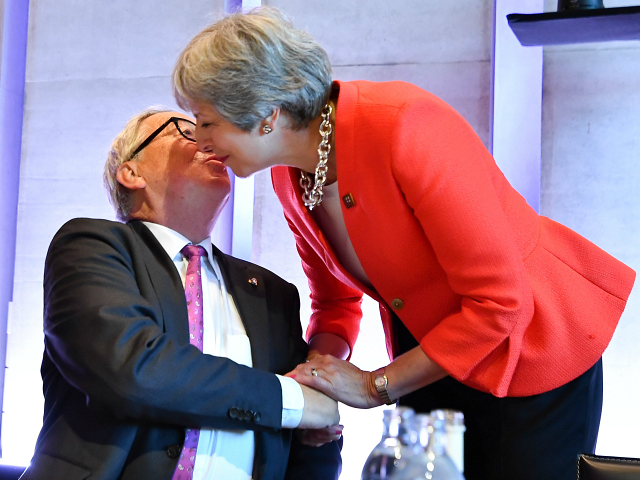The Withdrawal Agreement with the European Union negotiated by Theresa May could see Britain’s ‘transition’ out of the bloc extended to “31 December 20XX”.
Brexiteers and Remainers of all parties are expressing shock and dismay as the legal text the Withdrawal Agreement with the European Union is examined in detail, revealing a state of affairs which could leave the country trapped within a customs union governed by the EU’s institutions without any representation within them and without permission to withdraw unless the EU gives its permission.
Article 132 of the agreement, in particular, suggests that the so-called ‘transition’ or ‘implementation’ period to the end of 2020 — in which the United Kingdom will remain subject to all the commitments of a full EU member but without any representation in its Council, Commission, or Parliament — could be extended “up to [31 December 20XX]” at the British government’s request.
The Prime Minister was asked in Parliament Thursday morning whether this means the period could in theory be extended all the way to 2099 — 81 years in the future — but did not give a clear response.
The agreement further stipulates that any European Union citizen who enters the United Kingdom during this transition period shall have full residence and related rights in the country — as will their partners and family members, wherever they live and whether or not they are dependents of the EU citizen already resident in Britain.
However, it is the aforementioned customs arrangement which will follow this potentially neverending transition which was the last straw for David Davis’s replacement as Secretary of State for Exiting the European Union, Dominic Raab.
Raab was reportedly not shown the text of the Withdrawal Agreement until the last minute, and described it as “an indefinite backstop arrangement, where the EU holds a veto over our ability to exit… a hybrid of the EU customs union and single market obligations.”
While there has been some suggestion from the Prime Minister’s camp that these arrangements are merely a temporary solution to the supposedly all-important question of how to keep the border between the Republic of Ireland and the British province of Northern Ireland open, the Withdrawal Agreement is clear that the transition period must be used to “establish ambitious customs arrangements that build on the single customs territory provided for in this Protocol” to replace the backstop.
The Withdrawal Agreement may have a particularly nasty sting in the tail for Britain’s much-diminished fishing industry, which has hit harder than any other individual sector by European Union membership as a result of the bloc parcelling out more than half the country’s fisheries to foreign vessels.
Ending the Common Fisheries Policy and taking back control of Britain’s territorial waters has been held up as “the acid test of Brexit” by eurosceptic leaders including former UKIP supremo Nigel Farage, and the political declaration accompanying the draft deal does make some (fairly vague) references to Britain becoming an “independent coastal state” — but this is not in the agreement itself.
Indeed, the European Commission’s press release on the agreement states that British fishery and aquaculture products will be specifically excluded from the “single customs territory” arrangements — with the text of the agreement itself appearing to suggest that the fishing industry will be shut out “unless an agreement on access to waters and fishing opportunities is applicable between the [European] Union and the United Kingdom”.
This would essentially entail Britain readopting the essence of the Common Fisheries Policy by another name — despite the Prime Minister promising it would cease to apply after the transition.

COMMENTS
Please let us know if you're having issues with commenting.